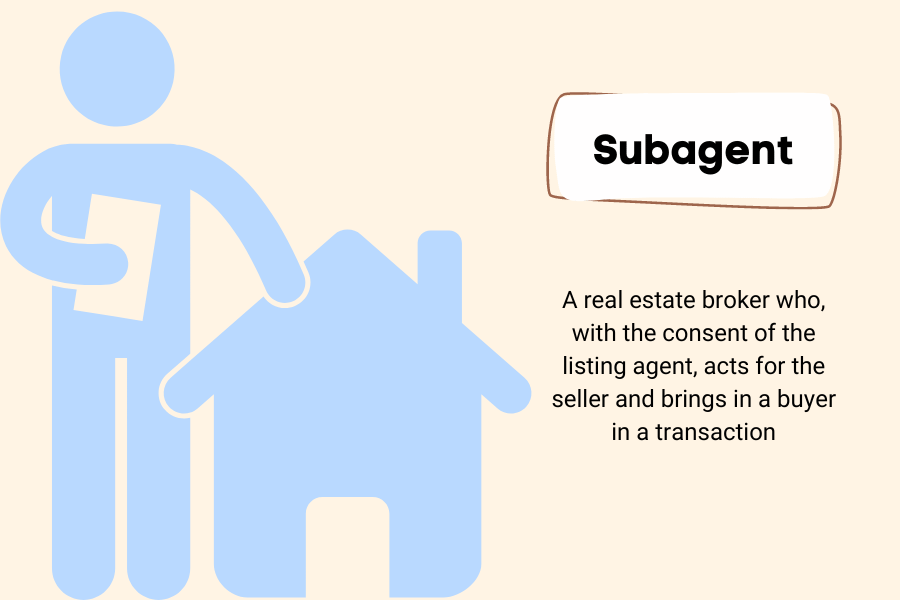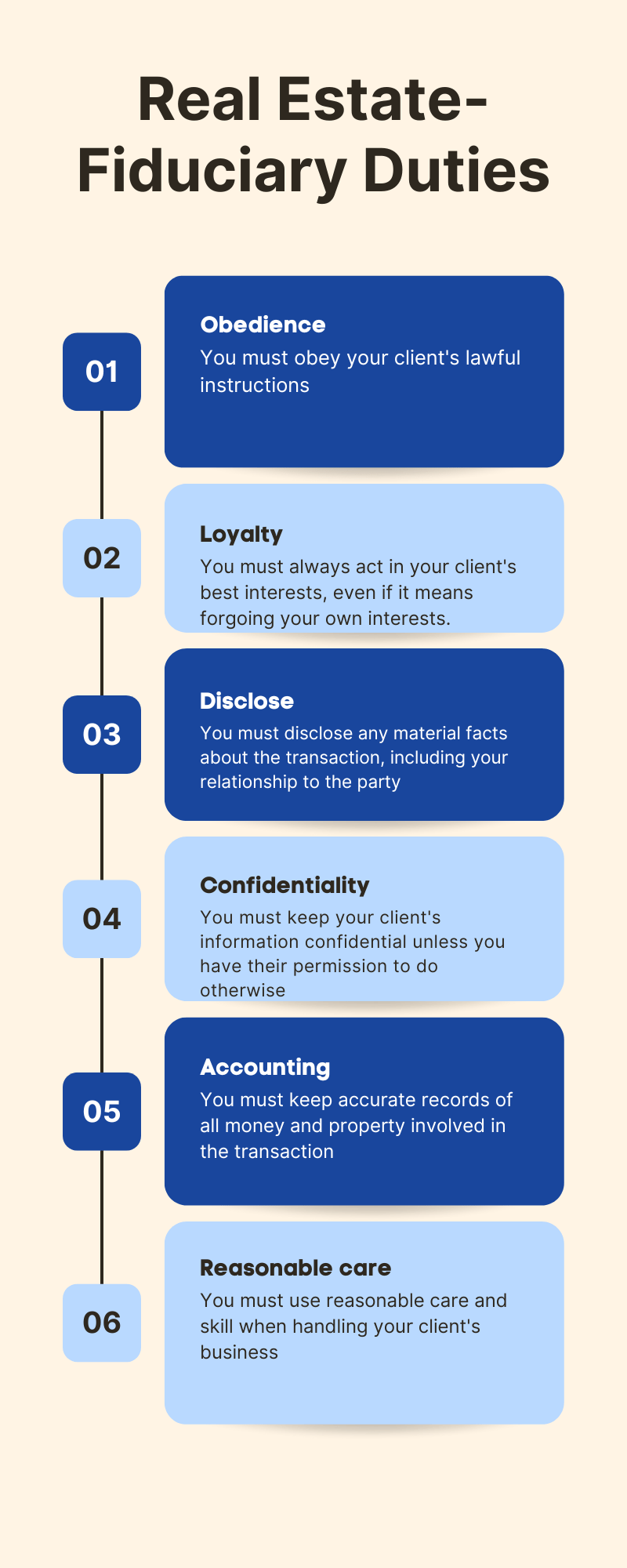


The real estate industry can be challenging to grasp at first. There are countless definitions, responsibilities, laws, and more that are crucial for you to understand before diving into business.
In this guide, we're going to break down what a subagent is and the responsibilities they hold in a transaction. But first, let's briefly dive into real estate and what an agent is responsible for. Follow along!
The overall definition of real estate is defined as property, land, buildings, and air rights above the land and underground rights below the land. However, working in real estate is now as simple as a definition. Within the industry, real estate refers to producing, buying, and selling property. According to the Bureau of Labor Statistics (BLS), the number of real estate agents and broker jobs is projected to increase by 4% between 2020 and 2030. The rise of real estate agents came to be in the last two years and could be because real estate is financially rewarding and fulfilling.
To become a real estate agent, you must complete 75 hours of coursework, pass your course finals, and then pass the state exam, and that's just the easy part. The hard work begins when you've passed and completed all of your requirements. Securing clients and building your business is a daunting task that's not for the weak. But you're golden once you get started and get your first client!

A real estate agent is a licensed professional representing buyers or sellers in a real estate transaction. The primary role of an agent is to work as an advisor to their respective party and act as their representative in negotiations. Real estate agents typically work for commission, being paid a percentage of the property's purchase price. It's important to remember that when becoming a real estate agent, your income is solely based on the number of clients you work with and your ability to close a deal.
During a transaction, the agent either represents the buyer or seller or sometimes both, depending on the state laws. Agents representing the seller in a transaction are the listing agent. Their role is to help homeowners sell their property. They do this by researching the market to help advise on an appropriate listing price, staging and marketing the property, getting potential buyers through the door, hiring a subagent to help find potential buyers, and assisting in negotiating offers on the seller's behalf. The role of an agent representing a buyer is to research homes that match their wants and needs and help them through the process of putting in an offer and getting to the closing table.
Having a buyer's agent is critical when you're looking to move or purchase additional property. They know the local market like the back of their hand, so they can find you a property that fits all of your wants and needs. A buyer's agent can also help you throughout the whole process of getting the home inspected & appraised, help with financing, title searches, and more! Nonetheless, a buyer's agent can ensure you're getting the most for your money by running comps. So, if you're looking to purchase a home, we highly recommend having a buyer's agent help you negotiate and secure your dream home!
Listing agents are commonly known as seller's agents. Throughout the real estate process, they are hired by the seller of the property to help them find buyers through the MLS (multiple listing service) or through their sphere of influence/professional contacts. Listing agents are a critical factor in getting your home sold. They help advise you on an appropriate listing price using recently sold homes known as "comparables" or "comps" because they have similar features to yours. They also help with negotiations with the buyer or buyer's agent to get the highest price possible for your home. Additionally, they can help you stage your property so it's at its best when potential buyers are walking through and everything in between!

A subagent is "a real estate broker who, with the consent of the listing agent, acts for the seller and brings in a buyer in a transaction." In other words, they work alongside the listing agent and work to get the best possible deal for the seller. It's important to note that a subagent's primary duty is to the seller, not the buyer. The primary role of a subagent is to bring in potential buyers. A subagent can be a licensed real estate agent working solo or a company hired.
So, how do you become a subagent?
One example of a subagency is when a buyer works with an agent but is also looking for properties independently. They may contact the listing agent of the home they're interested in to find out more information. Once the listing agent is reached and the buyer is interested in purchasing the property, the listing agent may ask the buyer's agent if they would be willing to act as the subagent. That way, they can still receive a commission. If the buyer's agent agrees, they must now disclose all information to both parties in the transaction and get written consent. Additionally, if a subagent brings in a buyer that ends up purchasing the home, the subagent will typically earn a commission from the listing agent.
You can also become a subagent if a listing broker hires you to help them find a buyer or by showing properties for the listing agent.
More times than not, subagency is seen as a disadvantage to their buyer. Since the subagent works on behalf of the seller, there is no obligation to obtain the best price or terms of the contract for the buyer.

As said before, a subagent is responsible for finding potential buyers and negotiating on behalf of the seller. They are bound to the same code of ethics as all other real estate agents and must adhere to all state laws and regulations. They must:
A fiduciary is someone who acts for another in a relationship of trust and is obligated to act in the other's best interests, placing the other's interest before any self-interest. The fiduciary duties in real estate are:
Subagents cannot do it all. Subagents cannot enter into exclusive agreements with either the buyer or seller. This means that the subagent cannot represent both parties in a transaction or have any kind of loyalty to one party over the other Subagents also may not disclose anything to the buyer that would give him/her an advantage in negotiations. Additionally, they cannot disclose anything that would put the seller at a disadvantage.
Agents must act lawfully since the client and agent are bound in a subagency. North Carolina is a "vicarious liability" state, meaning that clients can be held accountable for the work of their agent.
Subagents are less common nowadays as buyers typically like to work with one agent who only has their best interests. Subagency has become illegal in many states; however, it is still a form of representation in North Carolina. To enter into a subagency in NC, you must have the written consent of both parties.
Agency: The relationship between a real estate agent and the buyer or seller who hires the agent is referred to as an agency relationship because the real estate agent acts on behalf (i.e., as an agent) of the buyer or seller (the "client.") In an agency relationship, the agent has certain duties and responsibilities to the client.
Agency Agreement: A contract between you and a real estate firm that authorizes the firm and its agents to represent you. The agency agreement between buyers and agents is typically called a "buyer agency agreement"; between sellers and agents, a "listing agreement." Be sure to read and understand the agency agreement before you sign it. If you do not understand it, ask the agent to explain it.
Listing Agent: Also known as the "seller's agent," represents the seller in a real estate transaction.
Buyer's Agent: Also known as the selling agent, represents the buyer in a real estate transaction.
Subagent: A licensed real estate broker, licensed associate real estate broker, or licensed real estate salesperson who:
Dual Agency: When a single real estate agent represents both the buyer and the seller in a real estate transaction.
Designated Agency: When two different agents represent the buyer and seller, but both agents belong to the same real estate brokerage firm. The buyer has their agent, the seller has theirs, and the same brokerage employs both agents.
Exclusive Agency: A contractual agreement under which the listing broker acts as the agent or as the legally recognized non-agency representation of the seller(s), and the seller(s) agrees to pay a commission to the listing broker if the property is sold solely through the efforts of the seller(s), and the seller(s) is not obligated to pay a commission to the listing broker.
What is a subagency?
Subagency refers to a specific client relationship between a listing agent and another real estate agent who brings in a buyer to purchase the property.
What is the difference between a buyer's agent and a subagent?
Subagency usually raised when a cooperating agent from another brokerage who is not the buyer's agent shows a property to a buyer. The subagent works with the buyer to show the property but owes fiduciary duties to the listing agent and the seller.
What duties does a subagent owe to a customer?
A subagent owes fiduciary duties to the seller and must follow the code of ethics and all state laws & regulations. The fiduciary duties are obedience, loyalty, disclosure, confidentiality, accounting, and reasonable care.
When is a subagency created?
A subagency is created when one broker appoints other brokers as subagents to help perform client-based functions on the principal's behalf.

Subagency can be tricky and difficult to understand for most buyers, which is why it's illegal in many states. The most important aspect of subagency to remember is that you are working on behalf of the seller and owe fiduciary duties to the seller. If you want to be represented by someone who can give you their full loyalty and look out for your best interest, consider working with a buyer's agent!
Here at Raleigh Realty, we focus on helping people through the home-buying a selling process. We've got you covered if you're interested in moving to the area! We have a team of experienced and exceptional agents ready at your fingertips! Contact us or visit our website to be connected with a phenomenal agent who will help you in every way possible!